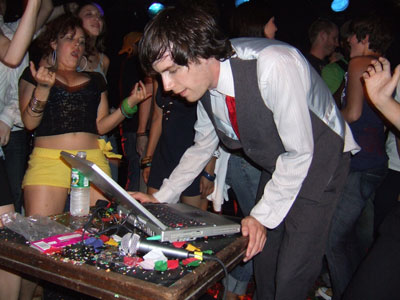
Girl Talk
A conversation with Gregg Gillis, the man behind Girl Talk.
Omar de la Rosa

After a busy year of nonstop touring, remixing, high-energy performances, and making some of the wildest pop-collages around, Gregg Gillis – aka “Girl Talk” – recently took some time off to talk by phone about a few issues regarding sampling law, the performance stylings of Dan Deacon, remixes vs. regular tracks, and the best mixed drink. After he found himself a comfortable place at home to sit and chill, I unleashed my first question…
• •
So I read somewhere that you used to play in a noise/punk band, is that true?
It wasn’t really punk, it was straight-up noise. I dunno if you’re familiar with like Merzbow or anything like that, but yeah, it was straight-up experimental music when I was like 15 ‘til I was like 18.
What moved you to go from there to collage/laptop-music?
I still like to follow the experimental scene as much as possible. I don’t listen to it as much now, but I was always a pop music fan even during my noise phase. When I was into that I found out about people like Negativland and John Oswald and Kid 606… all these guys that were doing more experimental sound collage stuff. In my high school band I did a little work with skipping CDs and tape collages and stuff like that. So when I started doing Girl Talk – when I was 18 – it was very experimental, actually. My first record was pretty noisy. I’ve always been a pop music fan and I slowly grew, more and more into mainstream music over the years and it’s all I listen to now. And now, I’m just trying to make pop music.
Do you think collage-music has become like a taboo because of the sampling issue?
Taboo in what sense? As far as releasing it?
Yeah, as far as releasing it. Even though you’re incorporating pop music, there are legal issues involved with sampling that has made it kind of complicated.
It’s definitely a tricky thing to put on. It’s funny in this day and age because there’s been a few – y’know, going back even to the ’80s – like 2 Live Crew and Negativland… there’s been a lot of controversy. And y’know, Negativland and the U2 case and then even up to the Grey Album with Dangermouse. It was a little bit of a tricky issue. But it’s funny now ‘cause it’s 2007 and people are looking at how music is released in a totally different way. Mainly because the CD is slowly becoming obsolete. And people are almost viewing it as less criminal in some way due to things like it existing so much on the internet – that’s where music lives these days. Everyone does remixes and collages and it’s all over the internet. I think with my case it still is a very tricky issue and you can get in trouble for releasing some types of music. I think in my particular case the album was just so filled with so many samples. Can you hang on a sec, it’s raining outside and I just gotta close my window…
[some rustling and stuff can be heard in the background for about 1 minute]
Hello?
Hey.
Hey. Sorry about that.
No problem.
Yeah, so I think with putting out my particular form of music, I think it’s a unique case. There are some 300 samples on the album. So it’s difficult to approach that in the standard of due royalties. Just trying to pay the artists what you’d get for a standard sample…
What do you think you should pay? I heard that you spoke to a congressman, Mike Doyle, about that… what was that like?
A congressman from Pennsylvania mentioned me on an actual trial on internet law in congress. He was supportive of my work. I mean, there are a lot of people. In my case, he was supportive even though I don’t know how familiar he was. But there is a whole movement [towards] more free culture, because information exchange is so ready right now. The way copyright laws are set up right now, they really limit the exchange of ideas and the production of new things.
I’ve heard of problems with the Digital Millenium Copyright Act (DMCA) but also that bands like the Go! Team still struggle to get stuff released here. What do you think, in a perfect world, sampling law should be like?
Right now, there’s a thing called fair-use that allows you to sample under certain criteria and the criteria is basically a subjective list of things like: “Is the work transformative?” “What is the nature of the work?” “Are you affecting the artist’s sales?” and things like that. So I think that is a positive thing, that you can’t put out a transformative piece of music that is negatively affecting the artist’s sales and things like that, and there’s no reason you should be able to release it without getting permission for it. But I think in a lot of cases, that is extreme. To get fair use, it’s very specific. Y’know where your music has to lie. And a lot of things don’t qualify for that like in the case of me, or Go! Team, when they use a few hundred samples on an album. Even if we wanted to go the normal route clearing the samples, we’d have to sell the CD for $50 to $100 just to pay the artists for the samples on each track. Not even covering our own expenses or to make a profit, just to pay them back. So I think that in an ideal situation, there’d be a middle ground, where fair use still stands. There would also be some sort of middle ground where, if the work is being transformative and is not negatively affecting the artist’s sales but may not fall under fair use, there could be a thing such as an upper limit on what you would have to pay in royalty. The cheapest CDs you can buy these days are like $10 approximately so there should be, maybe an upper limit on that so you can only pay a total of $5 for each CD sold – which is still an extreme case.
Another thing in the case of like me and Go! Team, it’s like you make this music and you spend a few years on it, you wanna put it out but there’s a big issue of turn-around time. If you go and try to get cleared for the samples it may take a couple years, up to a lifetime.

It’s letting a lot of good music sit unreleased, guys like Jens Lekman have entire albums finished just waiting months to clear individual samples to release them. On a different subject, I saw you at Bonnaroo a few months back – it was great by the way, awesome stage set you had and with all the people up on there – but I was just wondering, do you change your tracks up much live? They seemed a lot different than on the Night Ripper album. To what extent, if at all, do you change them?
Basically the way I make music in general is I have a big template of samples. When you hear me perform live, every handclap or kick drum is dropped in by hand along with layers of drums. Every time you hear a change, it’s me clicking it that second. You can imagine it like a big puzzle, y’know, I can take out a piece and put in a new piece. I can take out a piece and put in a new piece. Er, I guess a puzzle is a bad example. It’s just this giant grid of music. And I can look through the samples as I want. So maybe I’ll pull a beat – cuz I play shows every weekend – maybe I play a particular sample too much straight and I’ll get bored of it and wanna mix it up so I’ll take it out and put in something that I can exchange for this beat or this melody or this a cappella or whatever so it’s kind of an evolving piece of music. So maybe the day I completed Night Ripper, if you’d have seen me play it that day, I would’ve played Night Ripper straight up. But I clearly can’t edit [live] as fast as I can on record.
So what kind of software do you use? Just a wave editor?
No, no. That’s just what I piece it together with. Live I use a program called AudioMulch. So it’s like every single sample is done by hand. It’s an always-evolving piece of music. So now I’m going to start piecing together a new album sometime soon and it’ll kinda be based on what I’m doing now. But I would say every week I’ll have little bits and pieces that are changed and over the course of a year you make a lot of new music during the live set.
I noticed that you do incorporate a lot of ‘performance’ into your set. There’s a lot of dancing going on and it’s a pretty crazy show on the stage as you’re performing. Is there a certain point in the show where you let the music go and you just take over and dance?
Anytime I leave the computer, the same material loops over and over. In an ideal world I would just be hanging out with the audience the whole time and I wouldn’t really be playing the music. I don’t ever plan any of the shows very specifically. I used to, y’know, open up for bands and hip hop groups and things like that and back then people used to care less about the show or didn’t know me. In those cases it was always more confrontational, more performance-based. In the shows where I’m just going nuts and the stage fills up with people then it’s not needed for me to actually entertain with the visuals when everyone’s having a good time. I’m going through it in my mind: if the crowd is not dancing that much, I put in more of a performance edge, as I’m getting into it sometimes I can’t even move and I just try not to break anything.
I noticed that you were touring with Dan Deacon a few days this summer. I saw his show when he was here in Orlando and he was a pretty wild performer, too. What is it like touring with him?
The tour gets started in September, but I’ve played a lot of shows with him. I’ve known him for a number of years now and we kinda come from a similar scene of playing in basements and art galleries to no one and things like that. And I think we’re in a similar boat where we’ve been doing our thing for many years and have cult followings going on and then all of a sudden a few good reviews kind of found a new-found fan-base. He’s an amazing performer that’s actually hard to follow since he’s so interactive and he’s always on the mic, but I think we have a very similar aesthetic as far as our involvement with the audience. Y’know he always plays on the floor every show surrounded by people and I always try to get people up on stage. I think we both have a similar philosophy of just having a big celebration and being a part of it instead of just standing there, ‘I’m the performer, stare at me. You’re the audience, pay tickets to watch me do my thing.’ You could go further than that after playing basements shows, where you’re just hanging out with people.
That’s a great thing, though. Keep it up. I have a few more questions for you. On the subject of remixes, I heard your Peter Bjorn & John remix, but comparing it to the one done for Grizzly Bear, I noticed the PB&J remix used less outside samples – or at least less recognizable ones – than Grizzly Bear’s. Is there a certain decision you make to use more or less outside samples on remixes?
Doing remixes is a bit of a weird thing because you’re commissioned to do them and they kind of want a specific thing. So it’s more like you’re doing functional work, for me at least, as opposed to doing my own music, where I’m just gonna do whatever I want. So in the case of Peter Bjorn & John they wanted to release it and they’ve had it put out on a couple CDs now. They asked me not to use any samples and I was happy to do it since I do that kind of music all the time in my own home, y’know, I don’t really release much of it cause it’s just like a hobby of mine. In the case of Grizzly Bear, they were happy to do an internet release. They were open to me using as many samples as I wanted.
So that kinda goes back to the whole, y’know, complication with putting this type of music out and it is a bizarre thing when someone wants you to do a remix and you’re known for this very specific sound of music and they ask you to not do that. It’s like paying Metallica to do a song and you ask them to use pianos and harps. Which isn’t a bad thing, but it’s just a weird thing. It’s kind of why I actually started a side project with a friend of mine named Frank Musarra that’s called Trey Told ‘Em. And we’re just doing beats and remixes for people. And we’ve collaborated on a lot of stuff in the past but we kinda started just ‘cause: A, I just couldn’t keep up with a lot of my remix offers and, B, we just thought it’d be nice to have a different label for this remix work where, in the case of Peter Bjorn & John, it may not sound like Girl Talk at all. I kinda started this side-project thing strictly to do the remixes and make all Girl Talk work focused on being and sounding like Girl Talk.
You mention Merzbow and Japanese noise stuff but what sorts of things do you listen to and don’t sample? What are your favorites?
Aw man, that’s a good question. I listen to a lot of stuff from the 1990s. Just obscure indie-rock stuff and electronic stuff. That really influenced me. The IDM in the late ’90s, like Squarepusher and Aphex Twin and stuff like that. I really like Prefuse 73 and I really like that mid-to-late ’90s indie-rock stuff. Some stuff I touch on like Sonic Youth, but yeah, I listened to a lot of the experimental stuff. I don’t as much anymore. These days I listen to a lot of radio music. And if you listened to my CDs right now, there’s a lot of stuff there I wouldn’t sample, like Jesus Lizard and Brainiac and Blonde Redhead… kinda stuff like that, I used to listen to a lot in high school.
Well, my final question then: what’s your favorite mixed drink?
I lived with a guy from Kentucky for like three years and he got me into whiskey. So my favorite mixed drink would probably be a whiskey and coke straight-up.
Nice. Well thanks a lot. I appreciate your time for these questions. I hope to see you come here to Orlando sometime soon.
We’re actually just looking at booking that for sometime early next year and trying to make it happen.
Cool, hope to see you then and keep on making some awesome music. Thanks a lot.
Thank you. Nice talkin’.












